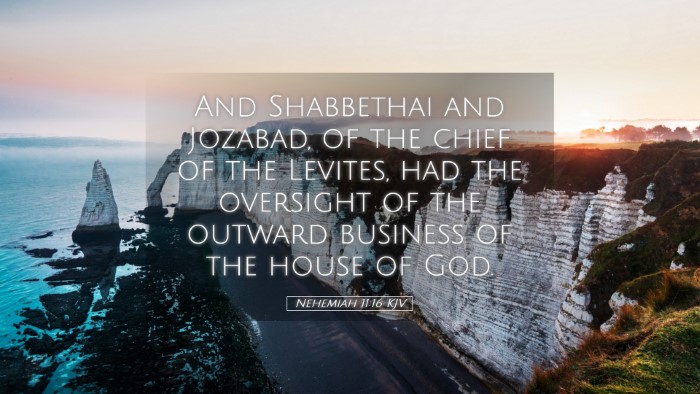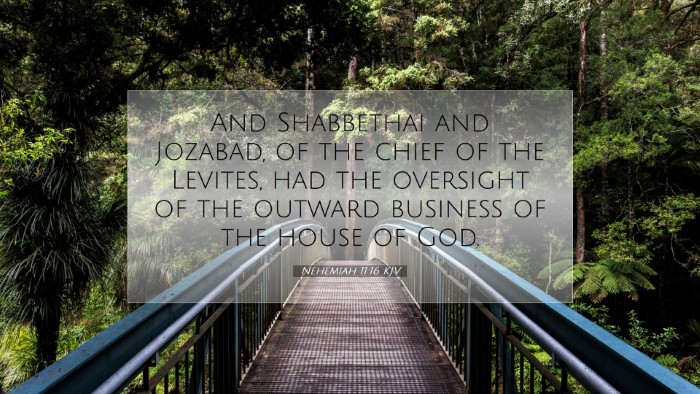Commentary on Nehemiah 11:16
Verse Text: "And Shabbethai and Jozabad, of the chief of the Levites, had the oversight of the outward business of the house of God."
Contextual Background
This verse exists within the context of Nehemiah’s reconstruction of Jerusalem and the re-establishment of its community after the Babylonian exile. It follows a series of leaders and Levites who were appointed to various roles as part of a larger effort to restore worship and governance within the city.
Insights from Public Domain Commentaries
Matthew Henry on Nehemiah 11:16
Matthew Henry emphasizes the importance of the roles played by Shabbethai and Jozabad as chief Levites. He notes that their oversight of the “outward business” suggests a dual aspect of temple ministry—the spiritual and the practical. Henry suggests that this reflects the broad scope of Levite responsibilities in ensuring that the house of God was maintained effectively and worship was not hindered by logistical issues.
Albert Barnes' Perspective
According to Albert Barnes, the Levites had a bifurcated role that included both spiritual leadership and administrative oversight. Barnes points out that their responsibilities in overseeing the “outward business” of the temple signify a structured approach to worship. This reflects the careful organization necessary for revitalizing temple functions post-exile, portraying a community restoration reliant on dedicated leadership.
Adam Clarke's Analysis
Adam Clarke expands on the functions of the Levites, indicating that they were not merely spiritual caretakers but also essential to the daily operations of the temple. Clarke illustrates how the roles allocated to leaders such as Shabbethai and Jozabad were necessary for maintaining order in worship, teaching, and ensuring the physical upkeep of the sanctuary. Their responsibilities serve as an archetype for church governance, emphasizing both spiritual and practical needs within the ministry.
Theological Implications
This verse raises significant theological themes pertinent to pastoral leadership and church administration today. The roles of Shabbethai and Jozabad can be seen as representative of the need for structured oversight in the church, where both the spiritual mission and practical operations intersect. Effective ministry requires leaders who embrace both dimensions, ensuring that worship is conducted with integrity and that the community is well-supported.
Lessons for Modern Ministry
- Holistic Leadership: This passage exemplifies the necessity for leaders who are well-versed in both spiritual and administrative aspects of ministry. Modern pastors can reflect on this dual competency in their own leadership.
- Community Responsibility: The work attributed to Shabbethai and Jozabad underlines the importance of teamwork in ministry. Collaboration among church leaders is crucial for the welfare of the congregation.
- Prayerful Oversight: The act of overseeing "outward business" not only involves operational tasks but also requires prayerful consideration of how those functions align with God’s purposes.
- Worship in Order: The arrangement of the Levites signifies that worship should be organized and intentional. In contemporary worship settings, this serves as a reminder of the importance of maintaining order amidst praise.
Conclusion
Nehemiah 11:16 encapsulates a moment of intentional oversight in a community eager to restore its spiritual identity. The diligence of leaders like Shabbethai and Jozabad offers timeless lessons in leadership, reminding us that effective ministry blends both spiritual fervor and practical wisdom. For pastors, students, and theologians, the text invites reflection on how the lessons from these Levites can inspire modern church governance and community life, affirming the role of structured leadership in the life of the faithful.


